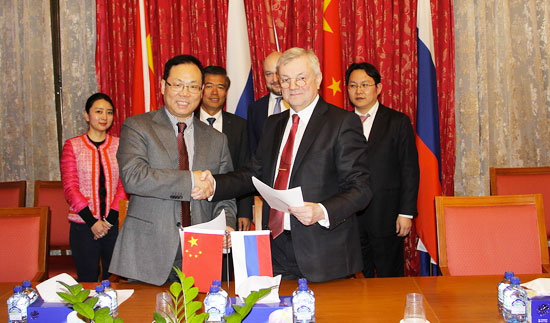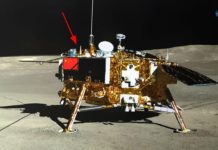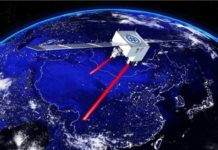According to Russian news agency TASS, Russia and China have finalized a cooperation agreement to extend their partnership in space-related activities. Under the agreement, Russian space contractor Glavcosmos will work with China National Space Administration (CNSA) and its subsidiary organizations from 2018-2022.
The agreement will see cooperation between the two countries in the areas of Moon exploration, deep space missions, remote sensing, space vehicles, and ground infrastructure. Other topics in discussion include Chinese use of the Russian module of the International Space Station (ISS), and Chinese use of Russian Earth Observation (EO) satellite data.
This announcement comes a month after a meeting between Russian space agency Roscosmos and CNSA in Moscow, which coincided with Russia’s largest airshow, MAKS-2017, where CNSA was an exhibitor.
This cooperation agreement is not new; Russia and China have collaborated closely over the years, with Glavcosmos stating in its website that “the People’s Republic of China has a special place among our commercial partners”, referring to the Russian-Chinese Space Cooperation Programme.
With the 2018-2022 agreement, however, it seems the Russian and Chinese space industries are deepening their relationship. The possible use of the ISS by the Chinese will directly contravene NASA’s directive to bar China from the ISS, which is said to be the reason why China is in the process of building its own space station.
Also, it possibly highlights Russia’s determination to continue operating a space station after 2024, which NASA is uncertain about; to this, Russia has responded by saying it will form its own space station if the ISS is shut down after 2024.
The agreement also suggests that Russia and China, who both have plans for a manned moon programme, might jointly work towards this goal. Both countries have already developed strategies for moon expeditions, with Russia planning a manned moon landing by 2030, and with China planning to launch its second lunar probe, Chang’e-2, later this year. At the moment, China is also conducting experiments on Yuegong-1, a prototype for developing a habitable base on the moon.
The agreement has already been drawn up, and is expected to be signed in autumn this year. Russia and China are also planning to collaborate on their Global Navigation Satellite Systems (GNSS), known as Glonass and Beidou respectively.







